 Zika Virus Disease
Zika Virus Disease
Zika virus disease is spread primarily by the bite of infected Aedes mosquitos, but also can be transmitted from a pregnant woman to her fetus and during sex. Most people infected with Zika virus display no or only mild symptoms. However, Zika infection during pregnancy can cause microcephaly – a condition where underdevelopment of the brain can lead to developmental delay, intellectual disability, and seizures – as well as other fetal defects such as absent or poorly developed brain structures, defects of the eye, hearing deficits, and impaired growth.
NFPRHA's Work
Providers of family planning and sexual health services will play an important role in helping women and men make informed decisions about pregnancy and childbirth in the context of Zika. In addition to advocating for the allocation of Federal resources to support Zika prevention and education within the publicly funded family planning network, NFPRHA provides technical assistance to support health care organizations to strengthen their organizational responses to Zika virus.
Resources
NFPRHA Publications
- Zika Diagnosis and Procedure Coding Job Aid (PDF) – NFPRHA developed this quick reference resource to assist providers in selecting appropriate diagnosis and procedure codes for patient visits related to Zika testing and treatment (January 2017).
- Zika Organizational Readiness Assessment Tool – NFPRHA’s Zika Response Organizational Readiness Assessment can be used by publicly funded family planning providers to identify the strengths and gaps in their organizational responses to Zika virus. It is designed not only to evaluate whether an organization has developed Zika-related policies and protocols, but also the extent to which operational considerations have been addressed.
Other Resources
- Zika Toolkit - Developed by the Office of Population Affairs, the Zika Toolkit suggests ways to put the Centers for Disease Control and Prevention (CDC) guidance into practice, contains information about how to counsel women and men about family planning in the context of Zika, and has resources for providers and clients who live in areas with and without local transmission of the Zika virus.
- Zika Virus Community of Practice – Facilitated by the National Family Planning Clinical Training Centers, this is a forum to share information, tools, and practices or to ask questions and discuss strategies to meet the needs of both pregnant and non-pregnant women and men of reproductive age.
- The Centers for Disease Control and Prevention – The CDC website contains a wealth of Zika information, including clinical guidance, trainings for health care providers, and free, multi-lingual patient education materials.
- CMCS Informational Bulletin: Medicaid Benefits Available for the Prevention, Detection and Response to the Zika Virus - Informs Medicaid agencies and interested stakeholders about how Medicaid services and authorities can help states and territories prevent, detect, and respond to the Zika virus, including efforts to prevent the transmission and address health risks to beneficiaries from the Zika virus.
- Scientific Research - Leading global health bodies including academic journals, NGOs, research funders and institutes, have committed to sharing data and results relevant to the current Zika crisis and future public health emergencies as rapidly and openly as possible.
For additional resources & information, access NFPRHA fact sheets and federal comments by issue or read NFPRHA's publications and recent press statements.